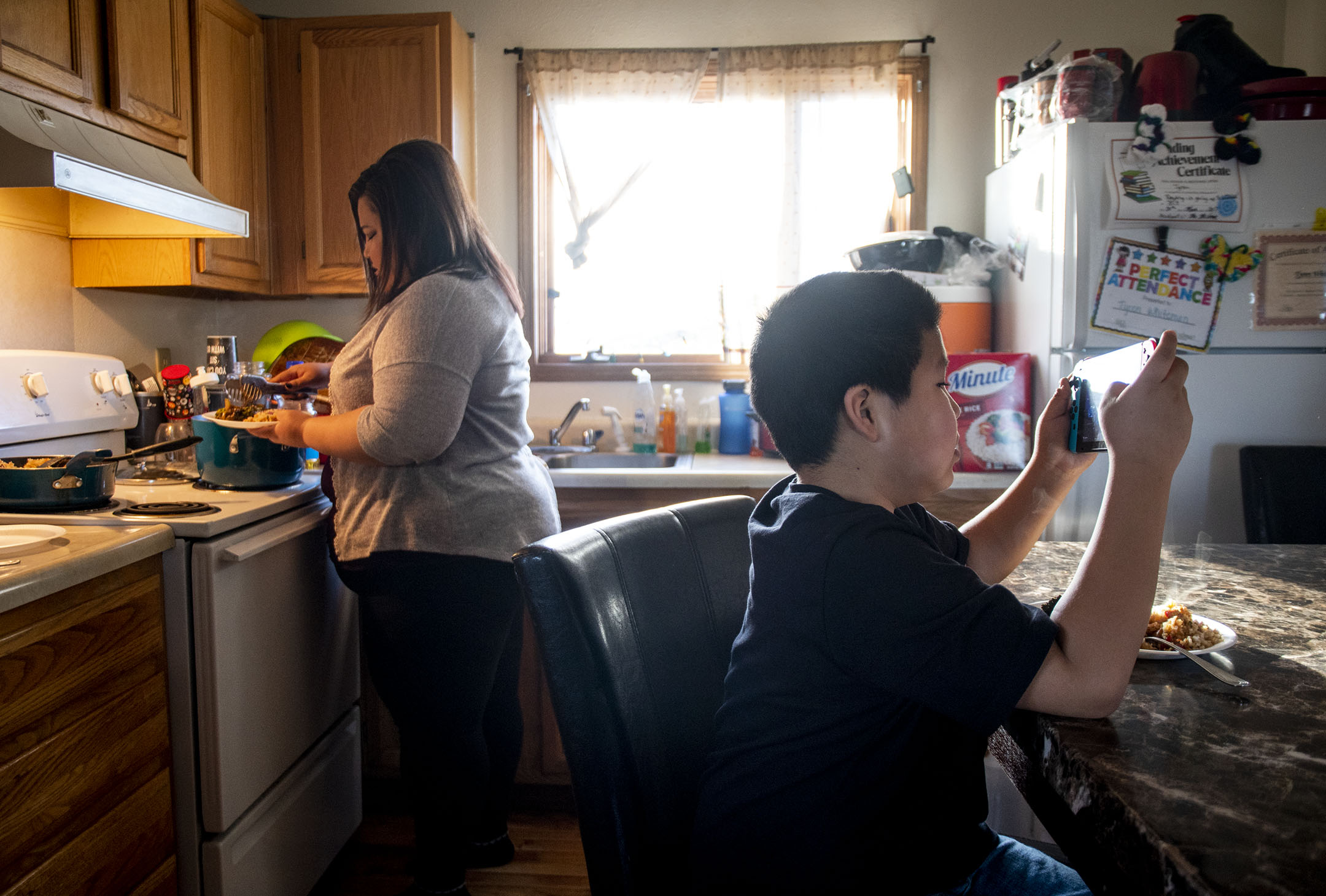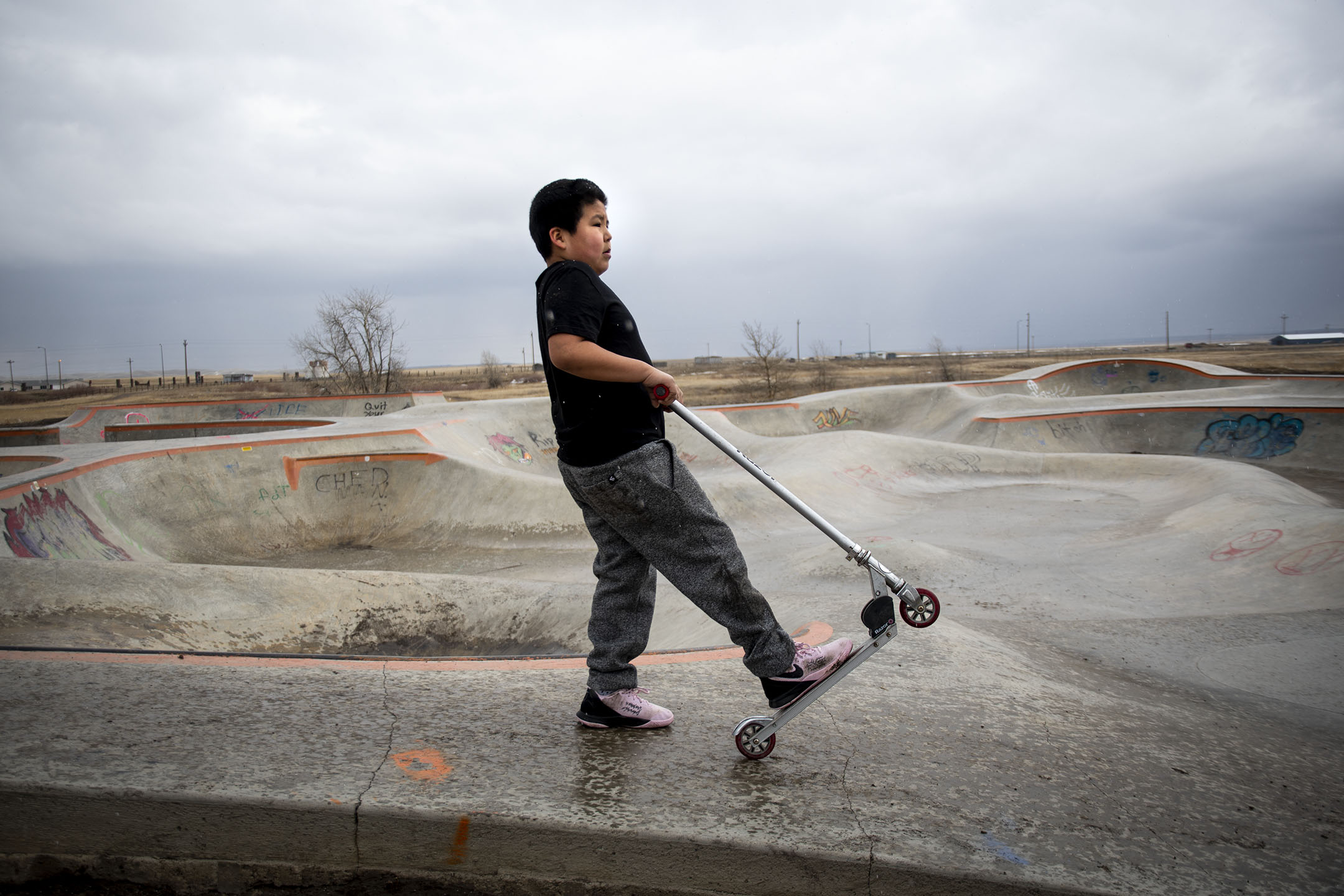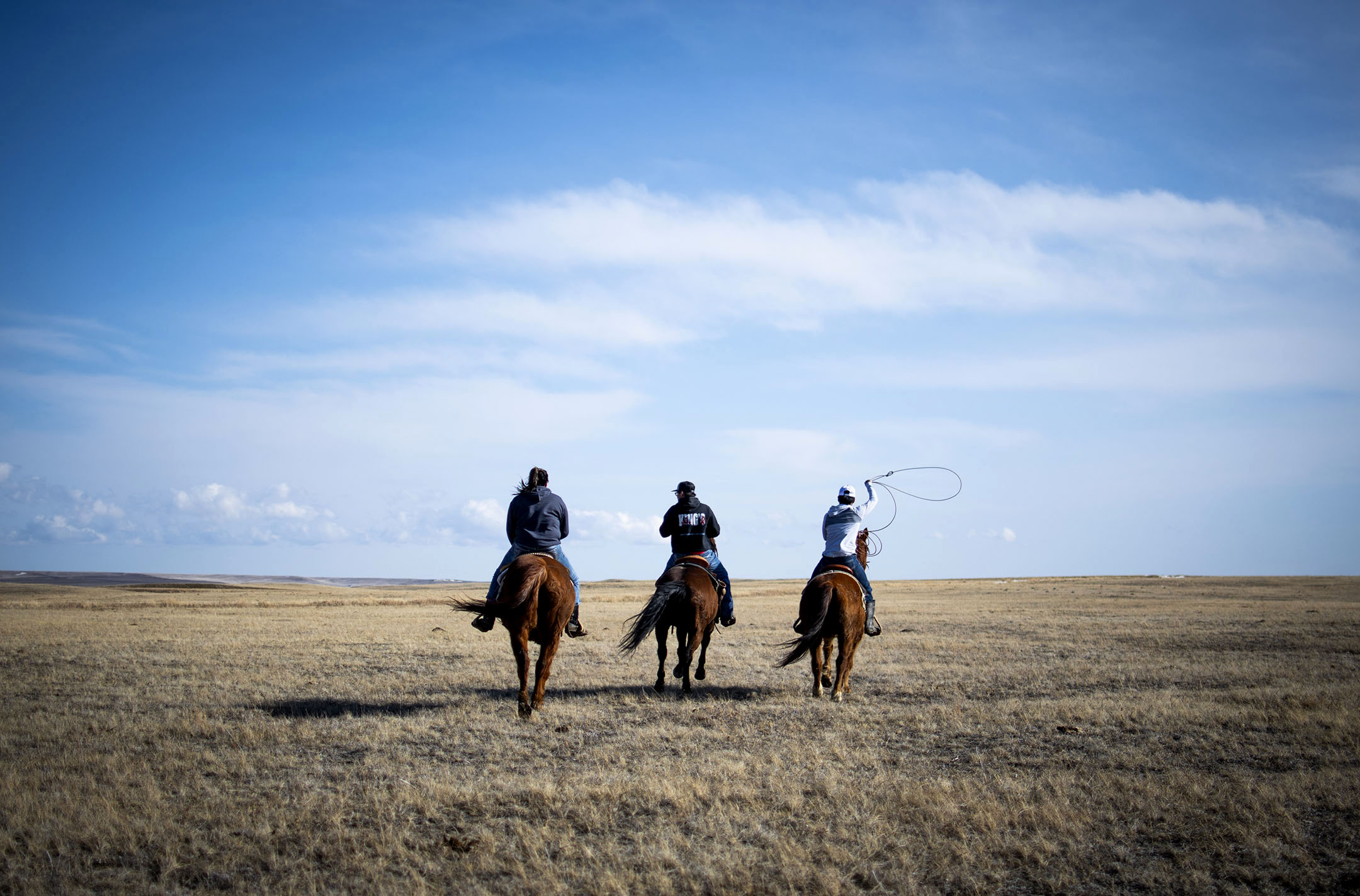Story by Jordynn Paz, Photos by Eli Imadali
Lindsay Whiteman had six children when she was murdered.
At the time of her death, half of them, the youngest, were living with her. The remaining three were spread across the Blackfeet reservation.
The oldest, Marselina Whiteman, is 19. Months before her mother’s death, she had given birth to her own children, twins. She was ready to begin her own family journey, using lessons learned directly from her mother.
Esrom “Fozzy” Whiteman, 16, grew up living mostly with his mother’s aunt.
Tyren “Chaca” Whiteman, 9, was taken in by his mother’s brother before his first birthday.
The three youngest—Michael Jr., 7; Shakina, 5; Hazley, 2—moved to live with their father, Michael Crossguns Sr., who is living in his grandmother’s home in Starr School.
While the children have always been apart, raised by extended family, after Whiteman’s tragedy in October 2018, the distance between each sibling seems bigger now without the matriarch to tie the family together.
“They are missing her constantly,” said Marselina Whiteman, about her siblings. “Sometimes they’ll just start crying and it’s hard to comfort them because you’re hurt too, and you don’t know what to say.”
In October 2018, Lindsay Whiteman and her friend Amy Sue Whitegrass were killed in Starr School, a small town on the Blackfeet reservation. During an altercation, Whitegrass pulled a knife on the two young men who were with them. The men responded by shooting her, according to the affidavit of the incident.
They then loaded Whitegrass’s body into the vehicle and planned to flee the scene. That’s when Lindsay Whiteman had gotten out and stood in front of the truck to stop them from leaving. The young men hit Whiteman with the truck and fled the reservation. Both women died of their injuries.

According to the Sovereign Bodies Institute, more than 85 percent of women murdered are mothers in its nationwide database of missing and murdered Native American females. This leaves behind hundreds of children, like Whiteman’s, in the United States and Canada who have lost their mothers to the crisis.
Of Whiteman’s children, family kept all six out of the foster care system.
Most times, children who lose parents are taken in by family members, said Mary Ellen LaFromboise, director of Child and Family Services for the Blackfeet tribe. It’s very rare that family members do not step forward.
Lily Gervais, the behavioral health clinical director at the Missoula Urban Indian Health Center said being raised by an aunt or grandmother or other relative is common in Native American communities.
Gervais, who grew up on the Blackfeet reservation and has been working with families and children at the Urban Indian Health Center since 2016, said that Native American people are taught to be communal and to look out for everyone.
“Everybody takes part in raising children,” Gervais said. “Not just the individuals.”
In Native American families, if a child is not raised with their mother present in their day-to-day life, they are still very aware of who their mother is.
“Mom always plays the role of mom,” Gervais said. “Even when kids are raised by family members, they still know who their mother is, the family doesn’t separate the two.”
According to Gervais, if a child was not raised by the biological mother, the loss is still just as great, possibly even greater. The child is losing out on not only the lost relationship with the parent but also the potential for reconnection in the future.

As the oldest of her siblings, Whiteman feels an increasing responsibility to her younger brothers and sisters. She feels a need to make sure her siblings are safe, but also connected. It’s been very difficult for the younger ones because they don’t yet know how to process their mother’s death, much less the fact that she was murdered.
Whiteman has managed to arrange regular visits with her siblings. She sees the second oldest, Esrom, almost daily. She sees Tyren about twice a week, and her youngest siblings maybe two or three times a month.
In June 2018, just a few months before her mother was murdered, Whiteman had twins, a boy and a girl. Her mother was present for Whiteman’s entire delivery and most of the time that the babies were in the newborn intensive care unit.
“She made sure I knew what to do when they came out, what to expect,” Whiteman said. “With me becoming a mom now, I can’t imagine if anything happened to me. My kids would be devastated.”
Whiteman and her kids bounce from her aunt’s house in Browning, to her boyfriend’s house in Cut Bank and to his family ranch. His family owns 30,000 acres of land on the reservation, just four miles south of the Canadian border and the Port of Del Bonita.
The ranch is where Whiteman spends most of her time. Among the rolling hills and meandering rivers is where she finds her peace and is where she can forget the loss of her mom for a moment.
She will often bring her siblings to the ranch to spend time with them away from Browning. There, they can hunt, shoot rifles, or ride horses and all-terrain vehicles.








Whiteman’s favorite is horse riding. Her go-to horse, “Tugboat,” is an easy going sorrel that likes to take it slow, just like her.
“It helps me forget what happened,” she said. “The only thing you get to focus on is not falling off.”
Even in times like this though, thoughts of her mother still creep in. Grieving is like the hills Whiteman rides on the ranch. One moment she is fine and on top of the world, then one memory of her mother reminds her of the loss and it all comes tumbling down.
Sometimes her siblings ask her questions about their mom and her death like “Why did it happen?” and “Why isn’t she here?”
Whiteman does her best to comfort them, but she doesn’t give details. She simply tells them these things happen for a reason and that their mom will always be with them.
According to Maegan Rides At The Door, Director of the National Native Children’s Trauma Center, traumatic grief is a common result of those who have lost a loved one to a violent death.
Traumatic grief differs from standard grief in that those experiencing it will pick up trauma symptoms such as re-experiencing, hypervigilance and isolation. This is not to say that everyone who loses someone to violence will experience traumatic grief, Rides At The Door said.
“It all depends, community by community, family by family and even individual by individual,” Rides at the Door said.

Of course, grief comes in many forms and is specific to each person, but grief within children is much more complicated. There is no way to say how a child will react to death and much of it depends on the nature of the child’s relationship with the deceased, the type of loss (violent or otherwise), previous trauma and a child’s age at the time of the death.
Considering a child’s developmental level, how they process grief will depend on how they understand death and what it means to lose, Rides at the Door said.
Young children in particular deal with a lack of understanding of their own feelings. Children can struggle with both identifying emotions and communicating the emotions they feel.
“Some kids can have a limited feelings vocabulary,” Rides At The Door said. “And they really just know four or five basic emotions but may not be able to identify ranges of emotions or intensities of emotions.”
This can impact a child’s ability to work through their emotions and later feel isolated due to a lack of understanding or comprehension.
The National Native Children’s Trauma Center is a program that serves Native American communities in the northwest by providing trainings and material on children who’ve experienced trauma for tribal welfare and child services. Currently, none of their programs are on the Blackfeet reservation.

Those who do not properly work through their grief and trauma can potentially have them “snowball” into larger issues like substance abuse and other high risk behaviors, until they get that opportunity to process what they’ve experienced, Rides At The Door said.
Of her six children, Lindsay Whiteman’s smile is best seen on her 9-year-old son, Tyren Whiteman. His round cheeks and dimples match his mother’s and his smile lifts in the middle, the same way his mother’s did.
Tyren, a fourth grader, likes to play his Nintendo Switch, football and basketball. He was taken in by his mother’s brother at eight months old.
He is the only one of his siblings that wasn’t close to his mother and not knowing his mother is one of the things that Tyren struggles with the most.
“He never called her mom,” said Donelle DeRoche, who is helping raise Tyren Whiteman with her boyfriend, Lydell Whiteman. “He called her Lindsay.”
DeRoche recalls Tyren holding onto her tightly at his mother’s funeral. He did not watch as they lowered his mother’s casket into the ground. Instead, he buried his face into his aunt’s shirt and she wrapped her arms around him, holding him close as he cried.
“The day they were burying her, that’s when he really broke down,” DeRoche said about her nephew. “It was one of his toughest days ever because he didn’t know her like the rest of them and I think he felt it.”
After losing his mother, Tyren Whiteman struggled a lot in school. His grades fell, and his teacher sent notes home expressing concern over his behavior.

Tyren, a fourth grader at Napi Elementary School, sat with his classmates in the school gym at the third quarter assembly earlier this spring. DeRoche sat alone on the opposite side in the second row.
The event was meant to pass out recognition awards to students. As they received an acknowledgement, they would leave the bleachers to accept a certificate and move to the center of the gymnasium for a photo.
Tyren sat joking with his friends while the award for ‘Best Behavior’ was announced.
As the teacher went down her list of names, students left the bleachers one-by-one. Soon, Whiteman was the only student from his class on the bench. He began to look around nervously and fidget with his hands. The teacher tried to make conversation with him, but that quickly fizzled out. They finished calling names and started taking a group photo for the school newsletter and Tyren sat alone on the red bleachers.
He had acted out a lot this quarter and despite bringing his grades up, he had gotten in trouble for fighting.
DeRoche finally decided to ask him why his behavior had shifted. Tyren broke down in tears and said he missed his mother.
Losing a loved one is difficult for any child, but that pain is magnified when the death is violent or sudden, said Gervais, the behavioral health specialist at the Missoula Urban Indian Health Center.
“There’s so many more emotions to deal with if someone died a violent death,” she said.
If the death were a murder, the common emotion is anger, Gervais said. Those around the death are more likely to feel intense anger.
If the death of a loved one is more “expected” due to old age or illness, people have more time to process, and the grief is much more manageable.
Grief manifests itself in other ways, too.
Marselina Whiteman’s relationship with her mother had only gotten stronger after the birth of her twins. She and her mother both played strong maternal roles in the youngest children’s lives.

Following her mom’s death, Marselina Whiteman fought to maintain that motherly sense of comfort for her brothers and sisters. She filed for custody of her youngest siblings. She was only 19, had two newborns, no job and no sustained place to live as she bounced around three different homes.
Her immediate concern was keeping the family safe and the youngest out of the foster care system.
“Everyone came up to me saying that they were going to get taken,” she said.
While Whiteman and her siblings didn’t grow up together, the youngest three had always been close to their mother and had never been separated. They needed one another, now, more than ever.
However, Michael Crossguns Sr., the young siblings’ father, said he was surprised by Whiteman’s custody filing. He said he had taken in the children immediately.
The custody hearing was heartbreaking, he said.
“When (Marselina) told me about our relationship, from her point of view, she made me sound like I was a monster to Lindsay,” Crossguns said. “I about cried in that court room just hearing her talk about me. I couldn’t believe that.”
The Blackfeet Family Court gave custody of the children to Crossguns, recognizing his claim as father.
Crossguns keeps his children on a short leash. Since Whiteman’s petition for custody, the two of them have had a strained relationship. He does allow the oldest two to visit their sister, but he does not let his youngest, Hazley.
Crossguns believes that seeing their older siblings reminds his children of their mother’s murder. He wants his children to move forward without that hanging over their heads.

“They’re still children,” he said. “They still don’t understand the basics of what the whole story is about or what’s going on.”
It is important for the adults who are caring for children to be open about the trauma the child has experienced, said Rides at the Door, of the children’s trauma center. The more they understand, the better they will be able to process what they are going through.
Whenever they ask their father about what happened to their mother, Crossguns tries to tell them the truth. Hiding things won’t help, although he does keep details vague due to their ages.
“I told them: ‘There was some bad people that were fighting your mom, and they ran her down,’” he said, making a forward motion with his hands.
The Crossguns children live on Meadowlark Drive, just four houses down from where their mother was killed. When they first asked what happened to her, their dad took them to the corner of Meadowlark and Starr School Road and told them, “her last moments were here.”
Each time they family goes for their two-mile walk around the neighborhood, they pass that corner. As they walk by, the children say “Hey, Mom.”

